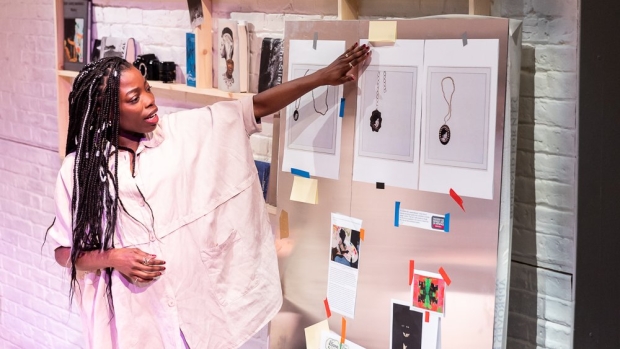The White Card at Leeds Playhouse and on tour – review

© Wasi Daniju
The White Card is almost like two plays: an hour's dinner party, followed, after a deft and challenging scene change, by a duologue in successful Black painter Charlotte's (who memorialises Black victims) studio a year later. The dating is clear: Trump has been elected, in the year gap, the Charlottesville, Virginia, battle over Confederate statues and the Me Too movement, among other things, appear and the play itself, bang up to date, premiered in February 2018. Had Claudia Rankine delayed in the writing, she would have had the death of George Floyd and the Black Lives Matter movement to take on board, such was the pace of racism in Trump's America.
We begin in the apartment of Charles and Virginia (surely no mistake!), opulent, the walls dominated by the pictures he has curated, each described in words as though to emphasise that it's the value of the picture, not its beauty, that counts. Eric, the dealer who fixes Charles' purchases, is there, too, and they discuss the tennis and the Williams sisters. They express horror at media abuse of the Williamses – surely they are opposed to racism in all its forms!
Then Charlotte, the guest of honour – Charles wishes to take her into his foundation which works to promote Black art – arrives. She is marvellously cool, very middle-class, and gradually the fissures begin to show in the white family. Virginia is convinced she met Charlotte before (it was another Black artist). Their son, Alex, appears and spreads the dirt on his father: he builds prisons and didn't lift a finger when his other son was arrested.
The final blow is when Charles unveils an image of just where Michael Brown suffered his injuries when murdered by a policeman – an image that horrifies Charlotte and Alex – but the most telling moment comes when Virginia, clearing up the dinner things, barks, "You're not my maid!" at Charlotte trying to help – the maid (Black, of course) had been given the night off.
A year later, partly as a result of the dinner party and the offer she refused from the foundation, Charlotte's latest exhibition highlights white complicity in the deaths of Black victims, onlookers no less than participants. Charles visits – and the play ends with an intensely reasoned debate about, ultimately, skin.
Natalie Ibu's direction, initially for Northern Stage, matches Rankine's writing in maintaining a coolness and politeness for much of the evening, only exploding occasionally. Kate Copeland's Virginia, unable to subdue her inherently racist attitudes, but charming withal, and Nick Blakeley, pursuing – very knowledgeably – the next big thing as Eric, are beautifully judged American stereotypes and CJ Coleman brings a fierce bitterness to Alex.
But it's Charles and Charlotte who really matter and Estella Daniels and Matthew Pidgeon deliver. She, poised, delivering her barbs only when forced to, increasingly forthright in the final scene, even suggests a hint of pity for the white people who cannot see the importance of "the white card", and he, trying to do good, limited by his whiteness, begins a journey of discovery at the end.










